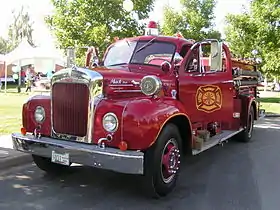Mack B series
The Mack B series is a model line of trucks produced by Mack Trucks between 1953 and 1966.[1] The successor to the 1940-1956 Mack L series,[2] the B-series was a line of heavy conventional-cab trucks. Adopting a more streamlined appearance over its predecessor, the B-series was designed with a sloped windshield and larger, rounded fenders[1] The model line was sold in multiple configurations, including tractors and straight/rigid trucks, cowled chassis (delivery body or bus), or fire trucks.
| Mack B-series | |
|---|---|
 1961 Mack B-series fire truck | |
| Overview | |
| Manufacturer | Mack Trucks |
| Production | 1953-1966 |
| Body and chassis | |
| Class | Truck |
| Body style | Truck (bonneted cab)
|
| Powertrain | |
| Engine | 6.8 L Magnadyne I6 (112 kW) (petrol) 8.4 L I6 (103 kW) (diesel) 11.0 L Thermodyne I6 (139 kW) (diesel) 11.0 L Thermodyne I6 T (164 kW) (diesel) 11.6 L Thermodyne I6 (157 kW) (diesel) 14.0 L Cummins NTC I6 T (250 kW) (diesel) 14.2 L Thermodyne V8 (190 kW) (diesel) |
| Transmission | Mack 10-speed duplex (5-speed, 2-speed auxiliary) Mack 15-speed triplex (5-speed, 3-speed auxiliary) Mack 20-speed quadruplex (5-speed, 4-speed auxiliary) |
| Chronology | |
| Predecessor | Mack L-series |
| Successor | Mack R-series |
.jpg.webp)
The B-series was the first Mack truck produced with a diesel engine, introducing the Mack-produced Thermodyne inline-6 in 1953.[1]
During 1966, Mack replaced the B-series with the Mack R-series, which lasted into the 21st century.[3][4][5] In total, 126,745 examples of the B-series were produced over 13 years.[6]
Model numbers & letters
Chassis model designations:
- B1x -
- B2x -
- B3x -
- B4x -
- B5x -
- B6x -
- B7x -
- B8x -
- B9x -
Chassis letter guide:
- B - school bus chassis
- C - flat face cowl for the addition of a delivery body
- E - built for export
- F - fire truck chassis
- L - light weight or weight reduced by using aluminum components
- P - platform chassis (single axle straight truck)
- R - right hand drive. This designation was started in 1964 but right hand drive available
- S - six wheel chassis (tandem axle)
- T - tractor chassis
- X - severe or extreme service chassis
_at_Hershey_2019.jpg.webp)
Engines
The B Model offered 10 different gasoline engines, from a 291 cu in (4.8 L) with 107 hp (80 kW) in the B20 to a 707 cu in (11.6 L) with 232 hp (173 kW) in the B70.
A wide range of diesels were also offered. From the B61 up to the ENDT 673 turbocharged I6 and END 864 V8 were offered. From the B73 up to the Cummins 855 cu in (14.0 L) I6s up to the NTC335 were available.
The table shows the largest gasoline and diesel engines in the series.
| Model | Engine | Displacement | Type | Horsepower | Torque |
|---|---|---|---|---|---|
| B20 | EN291 | 291 cu in (4.8 L) | G I6 | 107 hp (80 kW) at 2800 | 232 lbf⋅ft (315 N⋅m) at 1400 |
| B30 | EN331 | 331 cu in (5.4 L) | G I6 | 122 hp (91 kW) at 2800 | 264 lbf⋅ft (358 N⋅m) at 1400 |
| B4X | EN414 | 413 cu in (6.8 L) | G V8 | 214 hp (160 kW) at 4000 | |
| END673 | 672 cu in (11.0 L) | D I6 | |||
| B53 | END673 | ||||
| B6X | EN540 | 540 cu in (8.8 L) | G I6 | 185 hp (138 kW) at 2400 | 445 lbf⋅ft (603 N⋅m) at 1300 |
| ENDT673 | 672 cu in (11.0 L) | TD I6 | |||
| END864 | 864 cu in (14.2 L) | D V8 | |||
| B7X | EN707 | 707 cu in (11.6 L) | G I6 | 205 hp (153 kW) at 2100 | 615 lbf⋅ft (834 N⋅m) at 1200 |
| NTC335 | 855 cu in (14.0 L) | TD I6 | 335 hp (250 kW) at 2100 | ||
| B8X | EN707 | ||||
| NTC335 |
(Type: G=gasoline, D=diesel, TD=turbocharged diesel)[7]
See also
- Mack Trucks
- List of Mack Trucks Products
References
- Corporate History: 1950-1959 - Mack Trucks.com
- "Mack Trucks "YEARS"". www.macktruckshistoricalmuseum.org. Retrieved 2020-07-27.
- Corporate History: 1960-1969 - Mack Trucks.com
- "Mack Trucks "YEARS"". www.macktruckshistoricalmuseum.org. Retrieved 2020-07-27.
- Warth, Thomas E. (1998). Mack Trucks Photo Gallery. Iconografix. pp. 151–164, 164–165, 167–168, 170–177, 179–185, 188, 195, 197, 204–207. ISBN 1-882256-88-3.
- "Model Production Numbers (1905-2000)" (PDF). Mack Trucks Historical Museum. Retrieved July 27, 2020.
- Forier, Louis C., ed. (1973). Motor’s Truck & Diesel Repair Manual (26 ed.). Motor. pp. 1003–1004, 1107–1109, 1250. ISBN 0-910992-16-9.
External links
| Wikimedia Commons has media related to Mack B-Series. |
- Antique Mack truck forum
- Site specializing in B model information